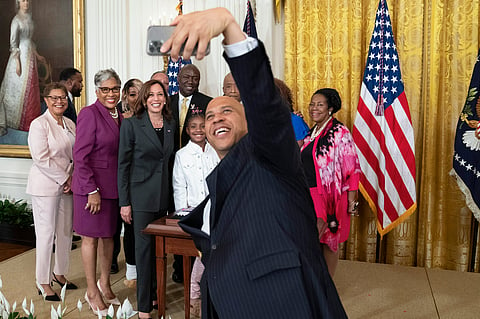

In a dramatic show of dissent, Democratic Senator Cory Booker took to the Senate floor this week with a marathon speech that lasted 25 hours and 5 minutes, shattering a record that had stood since 1957. His aim: to deliver a forceful rebuke of what he described as “a grave and urgent threat to American democracy” under the leadership of Republican President Donald Trump.
The address began late Monday evening and stretched into Tuesday night, effectively bringing the Senate’s normal proceedings to a halt. Booker, who represents New Jersey and is serving his second term, declared that he would speak “for as long as physically possible” in an effort to spotlight what he sees as a dangerous shift in U.S. governance.
“This is not politics as usual,” Booker stated early in his address. “This is a moment that demands clarity, courage, and resistance.”
Throughout the speech, Booker criticized a wide range of Trump-era policies, including proposed cuts to federal programs, downsizing of the civil service, aggressive trade tariffs, and shifting positions on key international alliances. He also mocked widely ridiculed proposals such as the potential annexation of Greenland and Canada, saying they reflected “a reckless foreign policy disconnected from reality.”
Booker didn’t hold back on domestic issues either, denouncing what he called the “gutting” of environmental regulations, the rollback of labor protections, and the administration’s confrontational posture toward the judiciary and media.
At one point, the senator referenced the Trump administration as the "Trump-Vance government"—a nod to speculation about future leadership aspirations involving Republican Senator J.D. Vance, a vocal Trump ally.
Booker’s unprecedented 25-hour speech broke the previous Senate record held by Senator Strom Thurmond, who spoke for 24 hours and 18 minutes in 1957 to delay passage of civil rights legislation. In a pointed reflection, Booker noted the irony of surpassing a record set by a man who tried to halt progress for African Americans.
“That this record was held by someone who fought to preserve segregation made it all the more important for me to push past it,” he told reporters after stepping down from the podium.
Booker, who reportedly fasted and abstained from fluids for much of the previous day to prepare, appeared visibly drained but resolute as he concluded the speech.
While Democrats currently lack majorities in both chambers of Congress, Booker’s speech has been interpreted as a symbolic rallying cry. His extended address drew praise from progressive groups, many of which view it as a much-needed show of strength in a challenging political landscape.
“He reminded us that even in minority, we’re not powerless,” said Maya Ramirez, director of the liberal advocacy group Future Forward. “His speech wasn’t just about policy—it was about the soul of the country.”
Republican lawmakers, meanwhile, largely dismissed the speech as grandstanding. Senator Tom Cotton called it “performance politics at its worst,” accusing Booker of “stalling for headlines rather than legislation.”
At 55, Cory Booker remains one of the Democratic Party’s more visible figures on the national stage. A former presidential candidate and ex-mayor of Newark, he has long positioned himself as a bridge between progressive activism and institutional politics.
His marathon speech, while unlikely to shift legislative outcomes in the near term, has cemented its place in Senate history—and could signal a broader strategy among Democrats to confront Republican leadership through high-profile symbolic gestures.
As Washington gears up for another contentious election cycle, Booker’s bold move may prove to be both a personal milestone and a bellwether of the party’s tone in the battles to come.